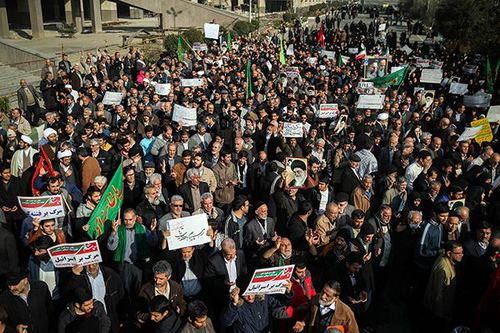Analyzing the recent unrest in Iran
- By Sajjad Malik
 0 Comment(s)
0 Comment(s) Print
Print E-mail China.org.cn, January 15, 2018
E-mail China.org.cn, January 15, 2018

Protests in Iran [Photo/rmzxb.com.cn]
More than a week of protests in Iran created widespread panic and anxiety in that conservative country. It all happened so quickly the government and its security machine was caught unawares, and officials are still trying to figure out exactly what went wrong.
There were deaths and arrests, but not on the scale witnessed in 2009. According to Iranian officials, more than 20 people died and over 1,000 were arrested, including many students.
Initially, it seemed the unrest might get out of control, but it never happened. The government was lucky as the demonstrations were badly organized and poorly led. There was also no visible pre-planned strategy to prolong them.
The absence of a credible leader or some kind of crowd-puller also worked in favor of the government. It can be said that the anger over soaring prices was genuine but it could not be funneled into a cascading avalanche of people pouring onto the streets.
The official response was also well coordinated, measured and decisive. Once the red button was pressed, the state machinery went into action and cleared the trouble-makers without much resistance.
The counter-protests in support of the regime did the rest by occupying major roads and chanting death to America and Israel and others.
Should the Iranian government consider it a victory against conspirators? Was the protest movement a foreign-funded coup attempt or a failure of the state agencies to address (genuine) grievances of the people?
Officially, it is being deemed a crushing blow against evil domestic forces trying to create unnecessary trouble on behalf of "enemies."
Despite such allegations, the exact amount of foreign interference to instigate the civil unrest is difficult to determine. Of course, such interference cannot be ruled out, given Iran's inimical ties with regional countries as well as acrimonious relationship with the United States.
However, in the presence of the existing political control of the government in Tehran, it is not easy for any power to meddle on a large scale.
Iran is a complex country, yearning for newness and change but also holding fast to tradition. The people have used available options to elect moderate and hardline presidents but the economic and political situation has not changed much. Iran's peculiar mode of controlled democracy has been working according to its requirements; however, young Iranians seem less happy with it.
There's hardly any political consensus as how to move ahead. It was also reflected during the protests when contradictory slogans were raised, including some in the support of restoration of the monarchy. It shows the protests were largely an outpouring of anger at domestic economic hardships.
It's true foreign powers trying for regime change in Iran could have easily hijacked the entire movement as we saw in case of uprisings in Syria and Libya. But that point never came. Iran was successful in stopping the drift of unrest towards anarchy.
However, the regime should not get carried away with the relative ease with which it controlled the situation. Rather, it is time for soul searching. The government should look at its regional policies and geo-strategic issues that are sapping its vital energies. The Iranian people have a right to ask why their government is pouring money into regional conflicts when they need basic amenities of life and daily items at cheaper rates.
The people have right to disagree and should have ways available to show anger through peaceful protests. The government should realize that when people take to the streets, they often issue demands, including a change in the government. They make demands as they expect the government to come forward and listen to them.
Every protest is not essentially against the established system of governance, although it can be against the bad policies of the government or its corrupt officials. The ruler should patiently listen to the grievances, rather than following the tendency to brand every opponent as a paid agent.
The Iranian government should listen to its people, especially those patriotic folks who have real issues and want authorities to address them. Otherwise, it might have to face bigger challenges.
Sajjad Malik is a columnist with China.org.cn. For more information please visit:
http://www.china.org.cn/opinion/SajjadMalik.htm
Opinion articles reflect the views of their authors, not necessarily those of China.org.cn.






Go to Forum >>0 Comment(s)